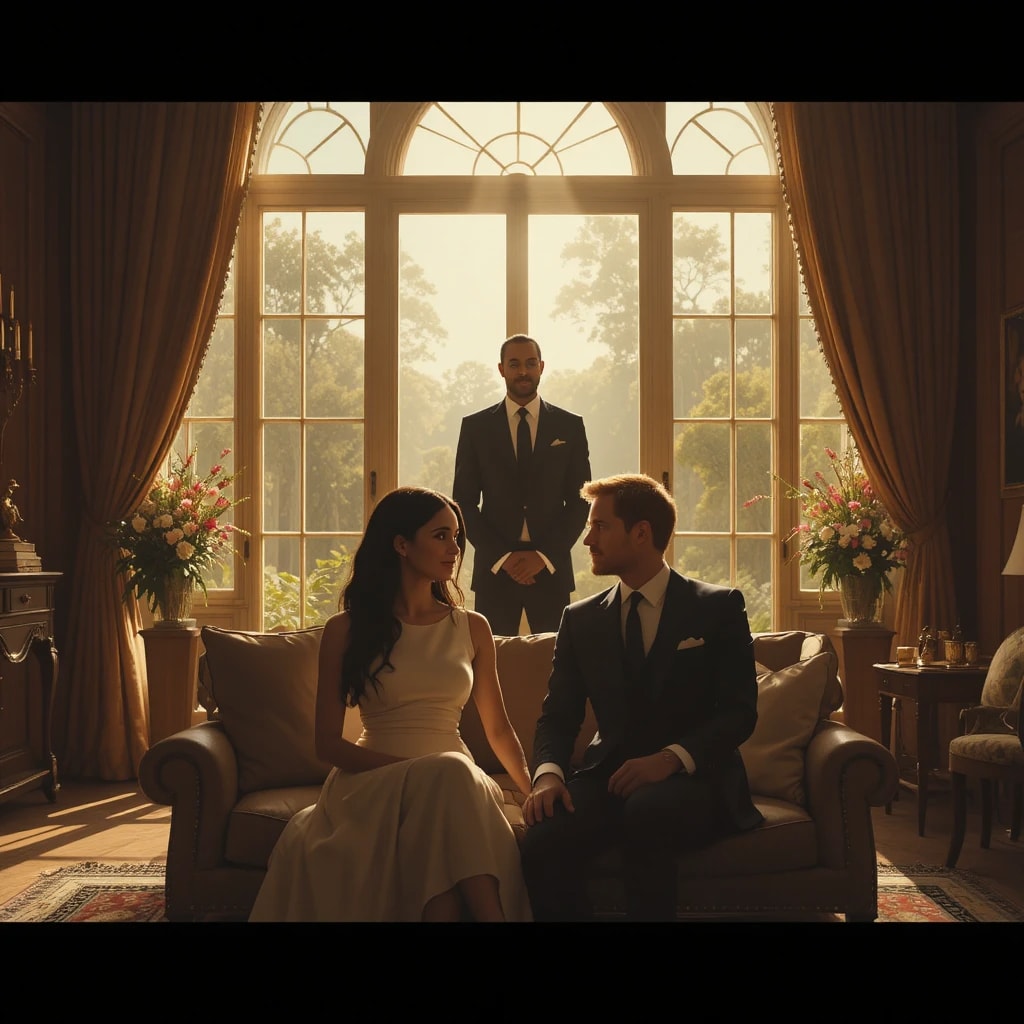When Prince Harry and Meghan Markle left the royal palace, it wasn’t just an exit — it was an escape. What the world didn’t see was the figure standing quietly behind their dramatic new beginning: Tyler Perry.
The Hollywood mogul, known for his creative empire and generosity, became the Sussexes’ unexpected savior. When doors in the UK closed, Perry opened his — a private jet, a Beverly Hills mansion with tight security, and privacy no castle could provide. To Meghan and Harry, it wasn’t just a home; it was sanctuary.
Perry offered more than safety. He provided structure — a team, communication control, even emotional support. When Meghan later revealed that Perry was named godfather to her daughter Lilibet, it symbolized trust. In royal tradition, that title carries deep meaning — it’s a sign of family. For a brief moment, the three of them seemed inseparable.
Then, silence.
Suddenly, Perry’s name disappeared from interviews, documentaries, and public mentions. Even online references shifted quietly. Something had changed. And as it turned out, that change wasn’t personal — it was strategic.
A major lawsuit had struck Perry’s media empire — accusations of workplace misconduct, a $260 million civil case. In the high-stakes world of PR, Meghan’s team began pulling back, deleting old photos, and adjusting the narrative. The man who once shielded them became a shadow they needed to outrun.
But Perry isn’t a man who forgets.
Behind his calm public image, he’s known for documenting everything — calls, emails, recordings — a lifetime habit of protecting himself in Hollywood. Those same records now reportedly contain months of private Sussex conversations: discussions about public image, planned interviews, even rehearsals for the Oprah special.
Buried deep within legal documents was something even more intriguing — a clause in Perry’s residency agreement that allowed him to speak if ever publicly erased. If one side denied the connection, the other could “protect reputation” by disclosing context.
That clause changed everything.
When Perry’s name vanished from public view, it wasn’t just symbolic — it was contractual. And quietly, that opened the door for Perry to share his side of the story.
Weeks later, a short clip surfaced online — less than a minute long. It captured Meghan and Harry discussing how to present their Netflix documentary. Meghan’s voice was calm but strategic. Harry’s was weary. They spoke about tone, emotion, and how much vulnerability to show. It wasn’t explosive, but it was real — too real.
The internet erupted. Suddenly, the fairy tale of two royals baring their souls looked more like a carefully managed production. Supporters fell silent. Critics grew louder. Hashtags flipped from sympathy to skepticism.
And through it all, Tyler Perry said nothing.
That silence was louder than any statement.
Behind the scenes, Harry reportedly withdrew, flying quietly back to the UK for private talks. Meghan’s team scrambled, issuing vague clarifications — “contextless fragments,” “rehearsed therapy sessions” — but the damage was done. The illusion of transparency cracked.
Then came a second clip — Harry, pacing, saying, “If we look too polished, it’s fake. But if we lean too much into pain, it’s manipulative.”
It wasn’t cruelty; it was calculation — the reality of media storytelling laid bare.
For Meghan, the fallout was swift. Brand partners reconsidered collaborations. Lifestyle projects stalled. PR firms advised “pause and recalibrate.” Even former allies grew quiet, unsure which version of the Sussex story would stand tomorrow.
And Perry? He remained still — precise, patient, deliberate. Those who know him say he isn’t seeking revenge. He’s seeking truth. He documented his role not to expose, but to protect his name.
That’s when one final revelation emerged — a signed agreement dated just weeks after the Sussexes arrived at his estate. In it, Perry was listed not just as host, but as Strategic Advisor. That phrase reframed everything.
It meant the Sussex rebrand wasn’t improvised; it was orchestrated. The Oprah interview, the Netflix deal, the brand-building — all planned under Perry’s guidance. He didn’t exploit them; he shaped their transition. But when the public narrative demanded a simpler story — the isolated couple against the world — Perry became the forgotten chapter.
Now, as new details emerge, one truth cuts through the noise: this wasn’t a betrayal. It was a reckoning. A reminder that even in a world of glamour and grief, stories are crafted, not just lived.
For Harry and Meghan, the lesson may be that control has a cost. For Tyler Perry, it’s that silence can be the most powerful statement of all.
In the end, what began as a royal rescue became a study in narrative — how trust, loyalty, and fame intertwine until the truth must eventually surface.
And when it does, it doesn’t whisper. It echoes.
